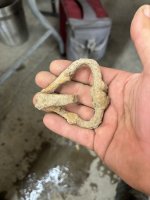Hello, this is my first post. I have recently gotten back into the art of finding points after about ten years. Although my findings are rather slim...sad really, I look forawrd to adding to my collection. I've been looking over this site for quite some time before I became a member. It's truely a wealth of knowledge. Right now I'm in the process of trying to find fertile ground and following leads from past years. The leads that I checked out were cold and in some cases the land is houses and shoping centers now. When it comes to the cold sites I know that there are still artifacts there. It's just the matter of finding them. And that leads me to my question for you. In general what and where should I be looking? I live in PA and corn fields are always a good place to start. My question is pointed more toward topography and features. What should I be looking for while out searching for a new place? When I'm out in the woods should I keep my eyes open to something other than the ground? Any and all advice would be greatly appreciated. Thank you in advance.
Amazon Forum Fav 👍
Upvote
0




